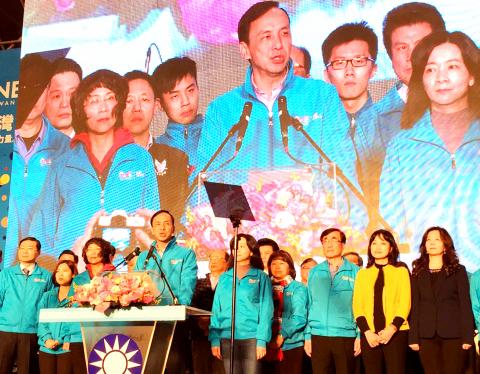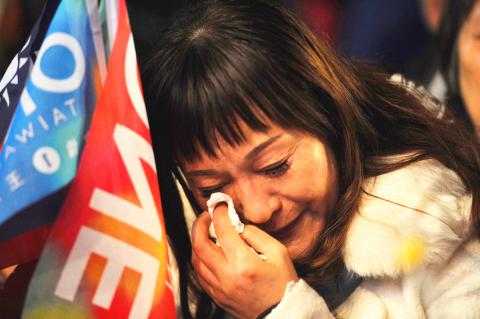The Chinese Nationalist Party (KMT) yesterday lost the presidential election to the Democratic Progressive Party (DPP) by the second-biggest margin since the nation held its first direct presidential election in 1996, shattering KMT presidential candidate Eric Chu’s (朱立倫) dream of keeping the party in power.
Chu, who had sought to win the presidency by branding himself as the nation’s sole choice for cross-strait peace and stability, garnered 31.04 percent of the total vote, while his primary challenger, DPP candidate Tsai Ing-wen (蔡英文), received 56.12 percent.
According to Central Election Commission data, Tsai won 6.89 million votes, leading Chu — who received 3.81 million votes — by 3.08 million votes.

Photo: CNA
The highest winning margin was recorded in the nation’s first direct presidential election in 1996, when the KMT’s candidate, President Lee Teng-hui (李登輝), beat his DPP challenger, Peng Ming-min (彭明敏), by about 3.5 million votes.
In the 2008 presidential race, the KMT’s Ma Ying-jeou (馬英九) crushed former premier Frank Hsieh (謝長廷) of the DPP by approximately 2.2 million votes.
In his concession speech delivered at 7pm, Chu first apologized to his supporters for failing to live up to their expectations and for “failing to fulfill the KMT’s obligation to safeguard the Republic of China” (ROC), before bowing for five seconds.

Photo: CNA
“As both the chairman and presidential candidate of the KMT, I cannot shrink from my responsibility and must shoulder the blame. Dear friends, I have failed you. I will immediately resign from my post as KMT chairman,” Chu said.
“No way, we will not allow you [to resign]. The [ROC] national flag must not fall,” his supporters responded.
Extending his congratulations to Tsai on her victory, Chu said he hoped Tsai and the DPP would steer the nation toward a brighter and happier future, to which his supporters shouted: “Impossible.”
Several KMT supporters shed tears as Chu spoke, with some leaving in the middle of his speech because “it is too sad to listen to this.”
However, a number of elderly supporters disrupted Chu’s speech, saying: “How dare you to keep talking after losing.”
Chu then pledged to reflect on the KMT’s defeat and the party’s failure to be in sync with public opinion, while vowing to re-evaluate the party’s policy direction and its selection of personnel.
“While we have lost the election, we still have an obligation to supervise the nation’s future direction and development, the new government and the new ruling party. This is what a responsible opposition party should do,” Chu said.
The loss marks the third time that the KMT has become an opposition party, after 2000’s unprecedented victory by then-DPP presidential candidate Chen Shui-bian (陳水扁) that put an end to the KMT’s nearly six-decade rule. Chen was re-elected in 2004.
It also deals a new blow to the KMT, whose disastrous defeat in the 2014 nine-in-one elections forced Ma to step down as KMT chairman.
A dismal atmosphere had been looming over the KMT’s headquarters in Taipei since the polls closed at 4pm.
Only a handful of supporters arrived at the headquarters for an open-air rally and to watch a live video feed of the ballots being counted about an hour after the count started. The approximately 250 red plastic stools set up at the rally were not filled until after 6pm.
As Tsai’s lead hit nearly 1.5 million votes at 5:30pm, Chu’s campaign spokesmen, Lee Cheng-hao (李正皓) and Hsu Chiao-hsin (徐巧芯), attempted to lift the spirits of the crowd.
“Let us point our ROC national flags in the direction of Chu’s office and cheer,” Hsu said to the crowd, adding that Chu had arrived at the building at 2pm.
With the gap between Chu and Tsai continuing to widen, KMT spokesman Yang Wei-chung (楊偉中) announced his resignation on Facebook at 6pm, saying he had tendered his oral resignation earlier in the day.
“After tomorrow, let us continue to strive for Taiwan’s freedom, equality and happiness,” Yang wrote.
Former Taipei mayor Hau Lung-bin (郝龍斌) stepped down as a KMT vice chairman after failing to secure a legislative seat in Keelung.

DEFENSE: The National Security Bureau promised to expand communication and intelligence cooperation with global partners and enhance its strategic analytical skills China has not only increased military exercises and “gray zone” tactics against Taiwan this year, but also continues to recruit military personnel for espionage, the National Security Bureau (NSB) said yesterday in a report to the Legislative Yuan. The bureau submitted the report ahead of NSB Director-General Tsai Ming-yen’s (蔡明彥) appearance before the Foreign and National Defense Committee today. Last year, the Chinese People’s Liberation Army (PLA) conducted “Joint Sword-2024A and B” military exercises targeting Taiwan and carried out 40 combat readiness patrols, the bureau said. In addition, Chinese military aircraft entered Taiwan’s airspace 3,070 times last year, up about

A magnitude 4.3 earthquake struck eastern Taiwan's Hualien County at 8:31am today, according to the Central Weather Administration (CWA). The epicenter of the temblor was located in Hualien County, about 70.3 kilometers south southwest of Hualien County Hall, at a depth of 23.2km, according to the administration. There were no immediate reports of damage resulting from the quake. The earthquake's intensity, which gauges the actual effect of a temblor, was highest in Taitung County, where it measured 3 on Taiwan's 7-tier intensity scale. The quake also measured an intensity of 2 in Hualien and Nantou counties, the CWA said.

The Overseas Community Affairs Council (OCAC) yesterday announced a fundraising campaign to support survivors of the magnitude 7.7 earthquake that struck Myanmar on March 28, with two prayer events scheduled in Taipei and Taichung later this week. “While initial rescue operations have concluded [in Myanmar], many survivors are now facing increasingly difficult living conditions,” OCAC Minister Hsu Chia-ching (徐佳青) told a news conference in Taipei. The fundraising campaign, which runs through May 31, is focused on supporting the reconstruction of damaged overseas compatriot schools, assisting students from Myanmar in Taiwan, and providing essential items, such as drinking water, food and medical supplies,

New Party Deputy Secretary-General You Chih-pin (游智彬) this morning went to the National Immigration Agency (NIA) to “turn himself in” after being notified that he had failed to provide proof of having renounced his Chinese household registration. He was one of more than 10,000 naturalized Taiwanese citizens from China who were informed by the NIA that their Taiwanese citizenship might be revoked if they fail to provide the proof in three months, people familiar with the matter said. You said he has proof that he had renounced his Chinese household registration and demanded the NIA provide proof that he still had Chinese